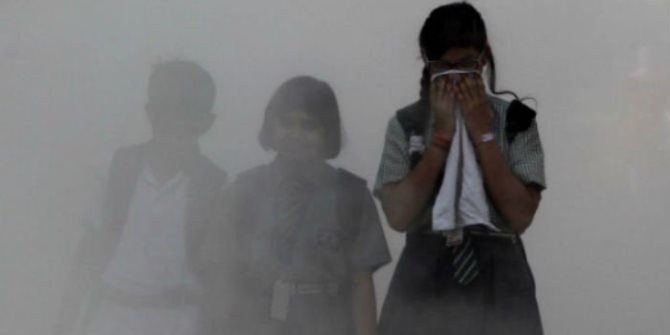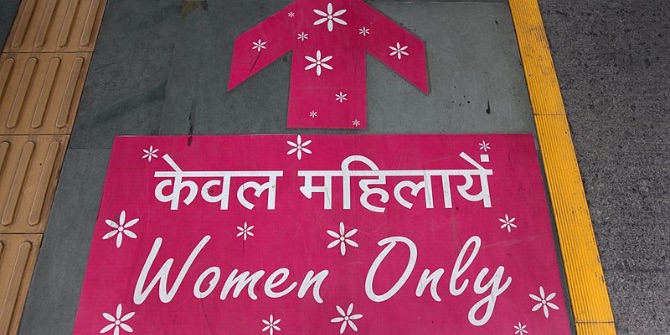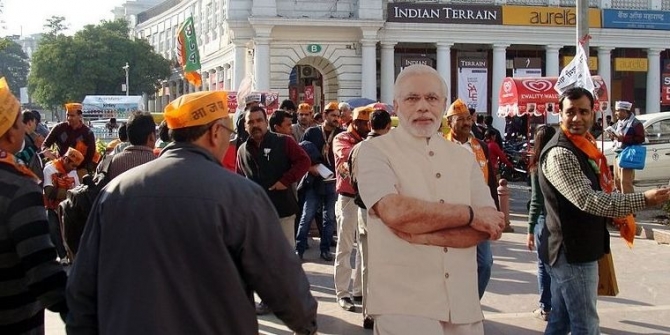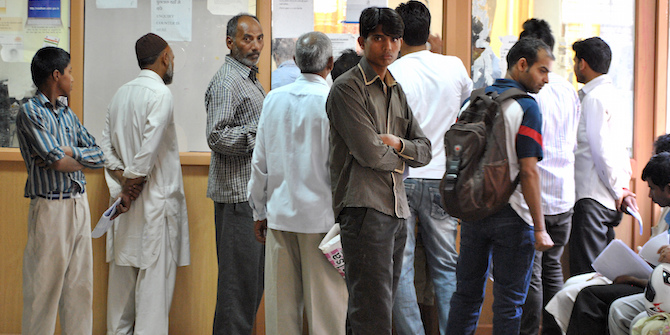As voting continues in the north-eastern state of Assam, migrants who have been living in other parts of the country for years give up significant time and income to travel back to their villages to cast their vote. Drawing on observations and interviews, Anna Wiemkem explores how the need to prove that they are not Bangladeshis turns into a costly burden of proof.
This article forms part of a series on the 2016 Legislative Assembly Elections. Click here to read more.
The shacks of corrugated iron around us are empty. Neighbours warned us before we entered the waste picker colony: “They will tell you that they are from Assam. But the place is full of Bangladeshis: lots of alcohol, lots of crime. Every now and then, the police take them back to the border.”
The friendly local representative of Prime Minister Narendra Modi’s Bharatiya Janata Party (BJP) adds: “You can tell they are foreigners from their way of speaking.”
In reality, the difference is often tenuous. Many people in India and Bangladesh alike have no proof of identity; some have only forged documents. Cultural and family ties across the frontier further blur the line, as do border disputes and the erosion that transforms the landscape of the Brahmaputra delta with each new flood. Numbers reflect this uncertainty: while the 2011 census puts the number of Bangladeshis in India at 3 million, half of them allegedly illegal, unofficial estimates vary between 10 and 20 million.
Back in Assam, immigration from Bangladesh has figured prominently in polarised discourses ahead of central elections two years ago, and state elections this month. Politicians from across the country have joined the fray: the BJP’s most senior representatives have promised to seal off the border and deport Muslim immigrants; the outgoing Congress Chief Minister has taken up the fraught task of creating a register of genuine citizens. Some have argued that the flow of Muslim migrants is unsettling a fraught communal balance, spurring new violence in the state’s long lasting conflict. Many have gone further, conflating Muslims with illegal immigrants; in cities outside Assam, preconceptions against “Bangladeshis” extend to rural migrants: for many, a Muslim from the North East is a Bangladeshi “until proven otherwise”.
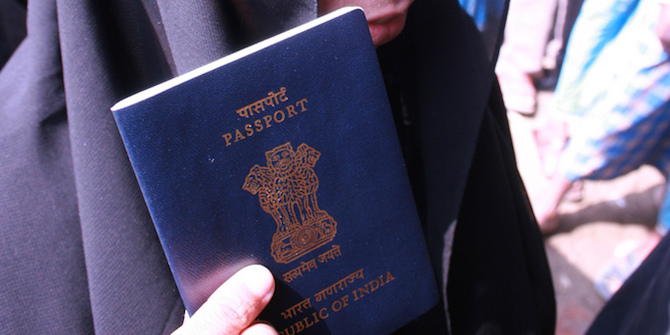
It rained the night before; a short spell that has since evaporated in other parts of the city. But in this pocket where some three hundred families live and work amidst the city’s waste, garbage carts have cut deep trenches into the mud.
As we look for a way back to the field of pale waste, we notice a young man standing in the low shadow of a roof:
“Are you alone?”
“Alone,” he says, “others will be back in a month. They are in Assam.” He steps into the hazy light: “For the elections.”
“How come you stayed back?”
“Normal tickets are sold out. I cannot afford more expensive ones.” A small boy peeps between his legs: “My neighbours’, I look after him while they are away,” he says, pointing at the child.
The total cost of the trip to Assam is $ 150, more than one month’s income for a waste picker.
“We have to vote,” the young man says. And then his chin pulls back briskly as if it wanted to dig itself into his neck: “If we don’t vote, people think we are Bangladeshis.”
“Would you go otherwise?”
“Probably not. It’s so expensive. You have to understand.”
In his shack across the field of waste, the leader of the All Assam Labour Union has similar concerns:
“Our problem is that people take us for Bangladeshis,” he says, bending towards us in the humid heat, his upper body twisted around a piece of gauze patched over an unhealthy bulge on his neck.
“When someone asks us for help, we check electoral rolls. If we do not find his name, we tell the police.”
As he speaks, the double line of his lashes and brows lifts into his forehead, as if pushing away from the hard swelling that traps the lower half of his face.
Then he poses, and his eyes are a dead line amidst the rugged skin.
“You are unwell, we will come another time,” we say, but his eyebrows lift once again:
“I asked our Member of Parliament in Assam to make arrangements for the journey back. He told me he would help if I could get him 50,000 signatures. Who can get so many signatures in such a short time? Still, I tell my people to vote in the village. That’s where they belong.”
On this piece of private land, the state feels at best elusive, at worst malign. Fears of being picked-up by the police are palpable. For a rent of $ 40—more than the going rate in the main colony—the landlord provides a shed, a common space to segregate waste, non-drinking water, holes that serve as toilets; people borrow from him to pay for medical expenses. They are not enrolled in the subsidised food programme, or if they do, their card, registered back in their village, is of no use in the city.
When asked what they expect from the government, many respond with an embarrassed laugh: “what can I expect? I am not from here.”
The problem is not that the regional government lacks political will: a recent reform entitles everyone who has appeared on one of the city’s voter lists to basic amenities and welfare benefits, a threshold more lenient than in any other part of the country. What is lacking instead is the ability to cut through layers of informality that stand between citizens and the state: to get the proof of residence required for a new voter card, families in the waste picker colony need a letter from the landlord; but the landlord, an Assamese himself, derives money and other benefits from the colony’s votes back in the home state. He has no interest in helping them get documents that will increase their independence.
A yet more powerful factor of alienation is the feeling of belonging, fostered by all those who benefit from the colony’s ties to Assam.
“We belong to the village,” people say when asked why they do not apply for a voter card in the city. As we probe, some mention long queues, and the money required at every step, but most others simply repeat: “We belong to the village”—even those who have been in the city for decades, who have grown old and will not make it back to the countryside.
Amidst the empty shacks, their choice feels awkwardly reasonable. The idea of a better home somewhere far away from the purulent walls of corrugated iron seems to offer something to cling on to, even if this comes at the cost of subsidised food and a pension. It is as if, for those who live here, belonging to the nation was a costly burden of proof, and an injunction to trace the “other” in their midst; as if belonging home meant to give up their inclusion in the welfare state in exchange for the idea of a village to go back to, somewhere, one day.
The waste picker colony exemplifies a pocket of extreme deprivation amidst the country’s overall success in reducing poverty—the kind of pocket that should be at the centre of attention, as nations of the world take up new Sustainable Development Goals. The case of these families suggests that addressing such persistent deprivation may require de-linking electoral citizenship from the right to a minimal inclusion into the welfare state, so that the pressure to prove their belonging does not come as a burden on the poorest.
This article forms part of a series on the 2016 Legislative Assembly Elections. Click here to read more.
Note: This article gives the views of the author, and not the position of the South Asia @ LSE blog, nor of the London School of Economics. Please read our comments policy before posting.
About the Author
Anna Wiemken is a PhD candidate at LSE, where her research focuses on access to services in urban areas. Before joining LSE she worked with NGOs in India for several years.



